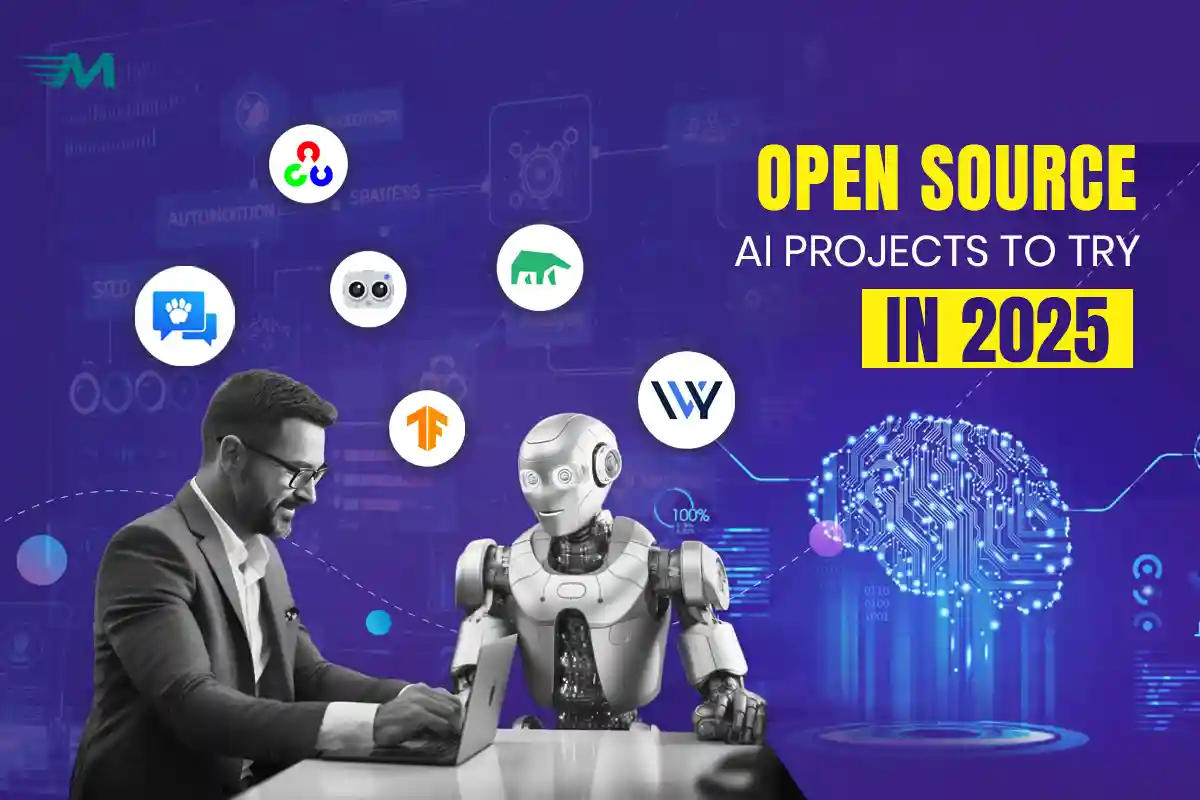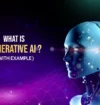Open Source AI Projects to Try in 2025
1. Introduction
The growth of the AI revolution keeps accelerating, with open source AI projects in 2025 taking central roles. More organizations, researchers, and individual developers want scalable and ethical solutions, so the move to open-source ecosystems is clearer than ever.
AI development has spread past the walls of technology giants’ labs. The open-source model allows anyone in AI to get access to the best resources, partner with top talent, and invent new technologies. The best open source AI projects in NLP, CV, generative models, or MLOps have started to drive meaningful innovation.
In 2025, a number of trends are changing our interaction with AI.
- Transparency: Developers are looking for clear explanations of how AI models operate.
- Collaboration: Community-driven development is accelerating progress.
- Accessibility: There are now tools that make getting started easier, need less coding knowledge, and have detailed instructions.
Open source AI projects for 2025 are available to discover in GitHub and Slack community groups. We’ve put together a list of AI projects to try in 2025, so you can find an opportunity to grow your abilities, join in, or even create your own tool.
Table of Contents
2. Why is it important to join or use open source AI projects?
Learning by Doing
Learning by actually working on projects is very effective. Getting involved in AI projects lets developers move away from theory and experience real-life situations.
No Cost Barrier to Entry
Anyone can get access to free AI projects because they do not require payment. You don’t have to invest in pricey licenses or big company software to start working.
Community Support and Collaboration
There are active communities for GitHub AI projects on GitHub, Discord, Reddit, and others. You can receive feedback, helpful guidance, and chances to collaborate in these groups, no matter your experience.
Ability to Customize and Extend
With open source machine learning projects, you can look at, adjust, and expand the source code in ways that suit your own requirements.
Resume and Portfolio Building
Working on AI projects for developers helps you build credibility, whether you are still learning, looking for work, or experienced. Listing your pull requests or project forks in your portfolio has a strong impact in interviews.
3. AI Open Source Projects You Should Check Out This Year (2025)
1. Hugging Face Transformers
In 2025, Transformers are at the top of open source AI projects, making it much easier to work with large language models. If you’re into NLP, this library is useful for working with BERT, GPT, or T5.
- Category: NLP
- Stars on GitHub: 100K+
- Ideal For: Great for studying how to handle and generate text with AI.
2. OpenMMLab
OpenMMLab provides multiple deep learning tools for computer vision and helps with tasks including object detection, image segmentation, and video classification.
- Category: Computer Vision
- Why Try: Easy-to-use modules and pre-trained models help make it one of the top picks in open source AI.
3. FastAI
FastAI is popular with educators and students since it turns hard deep learning code into simple interfaces. It fits perfectly into the plans for education and prototyping in AI projects in 2025.
- Category: Deep Learning Framework
- Unique Feature: Great support for PyTorch and Jupyter Notebooks is a key feature.
4. LangChain
LangChain is making how developers engage with LLMs much better. Its purpose is to help developers create things like chatbots and tools for retrieving data.
- Category: Generative AI
- Status: Among the quickest growing AI projects of 2025.
5. Stable Diffusion
People can now access creative AI through this popular model from Stability AI. It’s useful for people in design and development.
- Category: Generative AI
- Community: A lot of GitHub forks and active Discord groups can be found.
6. Auto-GPT
Auto-GPT is a tool that gives LLMs abilities to think, plan, and act on their own. It’s an important development in AI agents and automation.
- Category: AI Agents
- Use Case: It can automate looking up information and finding research.
7. MLflow
It’s a tool for managing ML workflows, keeping experiments clear, and ensuring models can be reproduced. This is a key project for people working on production-ready open source ML.
- Category: AI DevOps & MLOps
- Maintainer: Databricks
8. Haystack
Haystack is a tool that powers search engines with AI language interpretation. You can use it to build custom question answering systems, chatbots, or internal search engines for documents.
- Category: NLP + Search
- Suitable For: Developers working on system integrations in organizations will like this choice.
9. OpenAI Whisper
Whisper does speech-to-text work extremely well, making it a go-to tool for many audio processing jobs.
- Category: Speech Recognition
- Ideal Use: Podcasts, contact centers, making subtitles, and other related jobs.
10. DVC (Data Version Control)
It is very important to keep track of data and model versions in ML. DVC allows machine learning workflows to be versioned just like Git is used for code.
- Category: MLOps
- Why Use: Improve reproducibility and team collaboration.
4. Project Categories You Can Explore
NLP (Natural Language Processing)
Work with GitHub projects like Transformers, Haystack, or LangChain to help create chatbots, translation programs, or content summarizers.
Computer Vision
With projects such as OpenMMLab and FastAI, you’re able to create image classifiers, object detectors, and AR/VR systems.
Generative AI
Using free AI tools like Stable Diffusion or MidJourney alternatives, make art, music, and video by giving just a text prompt.
AI Agents & Automation
Auto-GPT along with AI tools 2025 are helping to bring about autonomous systems that mostly perform on their own.
AI DevOps & MLOps
Part of the new collection of open source AI tools, MLflow, DVC, and ZenML, are designed to improve every part of the AI life cycle.
Reinforcement Learning
Open-source tools like RLlib or Dopamine, even though complex, can help you develop game agents, robots, or economic models.
Speech Recognition & Audio AI
Whisper and Mozilla DeepSpeech are leading open source AI projects for doing audio transcription and speaker recognition.
5. How to begin working with these projects is explained here.
Prerequisites:
- Python programming
- Familiarity with Git/GitHub
- Basic machine learning concepts
Steps to Start:
- Go to the project’s official GitHub repository.
- Make sure to read the README and get the prerequisites ready.
- Copy the repository to your environment with git clone.
- Get your environment ready by using Conda, virtualenv, or Docker.
- Launch example scripts to see if the project is working.
Learning Resources:
- Project documentation and tutorials
- YouTube channels you can follow are CodeEmporium and Data Professor.
- You can look for help on StackOverflow, Reddit AI, or Discord servers.
How to Contribute:
- Find issues that are tagged as ‘good first issues’ or ‘help wanted.’
- A good first step is improving the documentation or fixing small bugs.
- Open pull requests and join conversation in the community.
6. How to Choose the Best AI Project for Yourself
Align With Your Goals
If you like working with language, NLP is a good option. Visual thinker? Go for computer vision. Use your interests to direct which AI projects you should try in the next few years.
Check Community and Maintenance
Be sure the project recently had commits and has a thriving, friendly community. Getting involved with unused AI projects on GitHub could mean you waste your time.
Look for Learning Aids
AI learning projects sometimes provide you with tutorials, notebooks, and datasets to help you get started.
Beware of Complexity
Not every project is beginner-friendly. Look at previous issues and the instructions for setup to see if the project is right for you.
7. The Rise of Open Source in AI
Decentralized Development
When projects are decentralized, people across the world can take part, without being stopped by who they work for or where they live.
Ethical AI Through Transparency
Easy access to code, data, and models in open source deep learning ensures fairness, transparency, and responsibility.
Open Source vs. Closed Models
The issue of proprietary versus open initiatives is still being talked about in 2025 by companies including OpenAI and organizations such as Mistral, Falcon, and Hugging Face.
Community-Driven Innovation
It is possible that AGI will come from global teamwork instead of lone research facilities.
8. Conclusion
Open source AI projects in 2025 are richer, more varied, and have a bigger impact than in the past. There are exciting and educational options for image generation, speech transcription, LLM uses, and AI DevOps.
You can do the following by looking into these free AI projects:
- Build practical skills
- Collaborate globally
- Contribute to meaningful innovation
- Accelerate your career
No matter if you need developer projects, workflow automation tools, or learning resources, 2025 holds something incredible for you. Join in on these leading AI projects 2025 and get started on what’s next for you, today.
9. FAQs
What is the best open-source AI project for beginners?
FastAI and Transformers by Hugging Face are top AI projects for learning due to their documentation and ease of use.
Can I use open-source AI projects commercially?
Yes, most open source AI projects 2025 are licensed under permissive models like Apache 2.0 or MIT, but always check the license.
Where can I find AI projects on GitHub?
Search repositories tagged with “machine-learning”, “AI”, or browse curated lists like awesome-ml and awesome-ai.
Are open-source AI tools safe to use?
Generally yes, especially when maintained by active communities. Be cautious about security when integrating into production.



